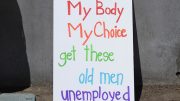By: Nicole Lashomb/Editor-in-Chief—
Pride season is not only a time of year where we come together as one community, celebrating, advocating, and affirmatively being who we are, or supporting family and friends that belong to the LGBT community. Pride n. a feeling or deep pleasure or satisfaction derived from one’s own achievements. As a community we have made great strides into 2014 at the municipal, state and federal level. We have more rights today, largely due to the Obama administration’s support of the LGBT community, than at any other point in history. But, what happens when one day we have achieved, legally at least, the same status as our heterosexual counterparts? Is the concept of pride dated? No, it is not.
Recently, I watched a movie called “12 Years a Slave.” If you haven’t seen this film, which is based on a true story, I highly recommend it. I was embarrassed and appalled throughout. Although there are stark differences in the type of discrimination that the African American community has faced and continues to face when compared with the mainstream LGBT movement, this movie did a brilliant job at repeatedly reminding the audience of how those in power use religion, the Bible, and politics to purposefully persecute a marginalized community. Although the premise is substantially different, those tactics as displayed in the movie are nearly identical to those faced by the LGBT community today. I couldn’t believe that after so many years since the protagonist’s plight that the hearts of those around us really haven’t changed much at all. [pullquote]Although the premise is substantially different, those tactics as displayed in the movie are nearly identical to those faced by the LGBT community today.[/pullquote]
So long as there are kids being taunted in school because of their sexual orientation or gender identity, so long as schools deny teachers the rights to include the LGBT community when sex education is taught, so long as youth are being kicked out of their homes solely for being LGBT, so long as judgment is preached from the pulpit and congregations blindly accept those teachings—even if that message is in direct conflict with the sermons preached by the Christ that they so often proclaim their love for—so long as one person is discriminated against in private sector jobs, so long as the right-wing fundamentalists continually modify their political strategies to ensure the LGBT community does not have equal rights, even sinking to the level of publishing fabricated studies to convince the masses of their agenda, an agenda I don’t fully understand, so long as women’s rights (societally and at all levels) and pay are not equal and we’re treated as second-class citizens. So long. It is not only about the legality and the recognition of us, all of us, and the many subcultures of the LGBT community, it is about what is in the heart of those that surround us. I am fully convinced that lessons of love and acceptance must begin at home first. But, if a family belongs to a church, for example, that preaches discrimination on any level, then likely, that is the message that the parents will teach at home too. And, that is just one of the many ways that discrimination continues to perpetuate its vicious cycle.
Today, many marginalized communities have rights that once were evaded in the past. However, does that mean that racism, for example, no longer exists? Of course not. Ask any member of a racially or ethnically marginalized group about their experiences and what type of discrimination they have faced as a result of the color of their skin and others’ ignorant perspectives and the answer shouldn’t shock you. Educate yourself. The same applies to homophobia, transphobia, misogyny, etc.
I’ve often spoken and written about the necessity to understand the struggles of the subcultures to our LGBT community as it relates to race and ethnicity, gender identity, women’s rights, and so on. This pride season is an ideal time to immerse yourself in your community, not only with those that relate directly to you, but it is an ideal opportunity to involve yourself in groups that indirectly relate to you as well. To be an advocate for the LGBT community means to undeniably understand the LGBT community as a whole and work toward changing the minds and hearts of those around you. How will you show your Pride?
*Nicole Lashomb is the editor-in-chief of The Rainbow Times. Reach her at: editor@therainbowtimesmass.com.







